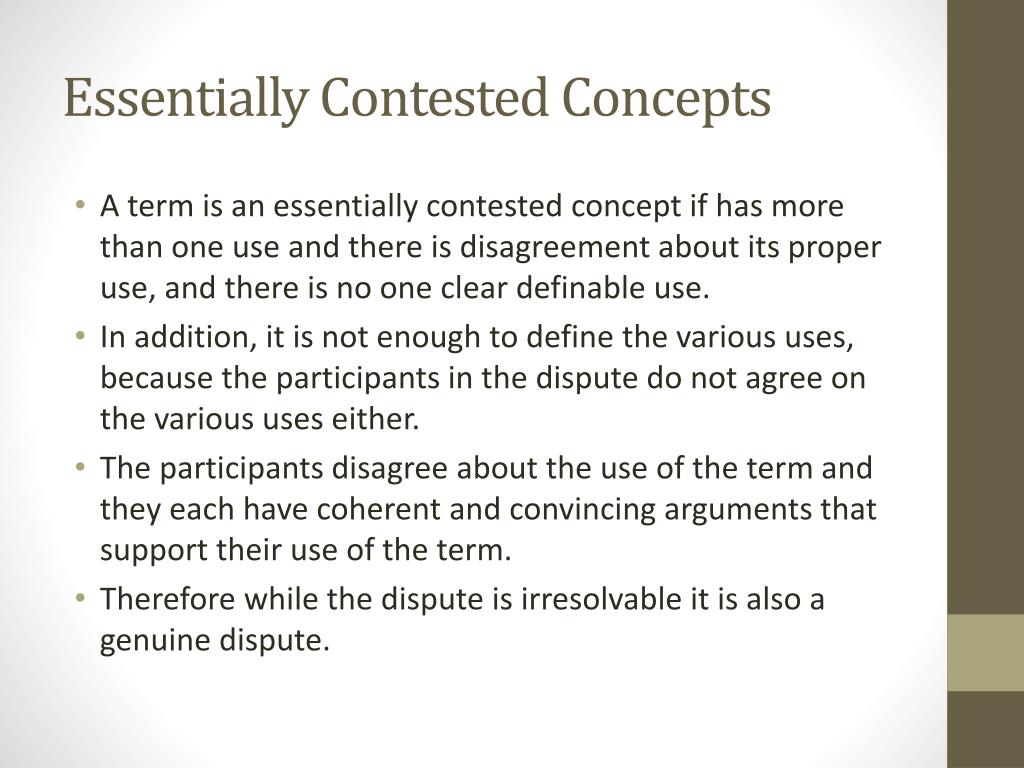A thought about ECCs (essentially contested concepts) recently became quite insistent. It is that ECCs constitute a major part of politics. But despite that, its scope and depth is poorly understood by most of the public. People know what they are talking about, but others may not because their conceptions of concepts are different. People wind up talking past each other and never reaching mutual understanding or stasis.
This helps to exemplify the scope and depth of the issue:
Q: Other than empirical facts, are there any concepts that are common in politics that are not themselves essentially contested concepts or that include an essentially contested concept(s) in how it is described or defined?A: In politics, it's challenging to find concepts that are entirely free from contestation or don't include essentially contested concepts in their definition. However, some concepts are less contested than others, particularly those that are more procedural or technical in nature. .... While some procedural and technical concepts in politics may be less contested, the field of politics is characterized by the prevalence of essentially contested concepts. As Connolly argues, "conceptual contests are central to politics," and engaging with these contested concepts is itself a dimension of politics
What helped to kick this thought into high gear was my recent foray into knowledge with Perplexity about whether the concept of “rational thinking” was an ECC or not. Its first answer was that rational thinking is not. Then I pointed out that human rationality, at least for politics, is mostly unconscious, intuitive, moral, biased and influenced by various psychological factors and social contexts. Perplexity mulled it over and concluded that rational thinking was an ECC. I was able to ask the right question because I base my conception of humans doing politics mostly on cognitive biology, social behavior and some moral logic. Most people probably would intuitively believe that rational thinking is a simple concept without much to disagree about. They would be mistaken.
So, (1) if concepts like constitutional, democracy, freedom, fair, justice, common sense, honest, corrupt[1], kleptocratic, moral, immoral, Founder’s intent, qualified candidate, transparency, truth, rational, biased, partisan, rule of law, civil liberty, equal protection, due process, theocracy, authoritarianism, free and fair election, election integrity, reasonable compromise, genocide, war, military action, police action, and so on, are all essentially contested, and (2) most people are unaware of what ECCs are, how prevalent they are, and how they shape thinking and belief, then (3) what can reasonably be expected from our democracy? There will be endless disagreements about most things because humans are human. For better or worse, ECCs reflect how the human brain-mind works. They are not going to go away.
Here is the question: In view of ECCs and attendant unresolvable disagreements, what can people reasonably expect from American democracy? From what I can tell, there are millions of sincere, well-meaning people who refuse to vote for Harris or Trump because both are bad enough to warrant that course of action. I suspect that for most of those people, very probably nearly all, differences in conceptions of various ECCs plays a non-trivial role in their refusal to vote for either of the two candidates.
To me, ECCs constitute a major weakness that democracy has in spades, while authoritarian regimes deal with them by various forms of force. Maybe that is why most humans have lived under authoritarian regimes for most of human history. Authoritarianism is the norm, while democracy is the rare exception to the rule. America appears to be on the verge of reversion from exceptionalism (democracy) to the mean (authoritarianism). Maybe we can reasonably expect no more than that reversion.
Footnote:
1. A recent supreme decision, Snyder v. United States, basically legalized corruption in politics by applying the labels “gratuity” and “reward” to various forms of payments to politicians and judges for their “good work.” The sleight of hand the court used was that the payment or tip had to come after the politician or judge did something commendable and worthy of a gratuity. I see that as legalization of corruption. The six radical Republicans on the bench who voted for that, see their conception of payments in politics as honest, not corrupt. Agreement on that point will probably never happen for me as long as I am alive. Corruption is an ECC!


No comments:
Post a Comment